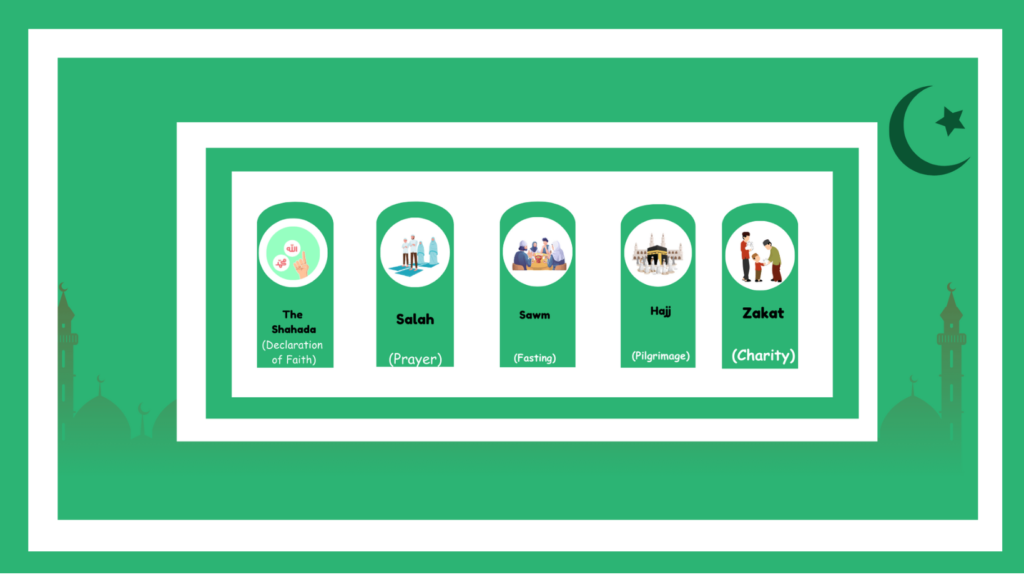
The 5 Pillars of Islam Explained Simply
A Deep Dive Into the Foundation of Faith
Introduction
Imagine building a house. A sturdy foundation is crucial to ensure it stands strong, weathering storms and challenges. For Muslims,
The 5 Pillars of Islam are the core beliefs and practices that every Muslim adheres to. They are Shahada (Faith), Salah (Prayer), Zakat (Charity), Sawm (Fasting), and Hajj (Pilgrimage). Think of them as the backbone of Islamic life, emphasizing worship, community, and discipline. Each pillar works in harmony with the others, shaping a Muslim’s daily routine and outlook, and bringing the essence of Islam—a religion rooted in peace and submission to Allah—into everyday life.
1. Shahada (Faith): The Declaration of Faith
The Shahada is the testimony of faith and the first step in becoming a Muslim. It is a simple yet profound statement:
أَشْهَدُ أَنْ لَا إِلَٰهَ إِلَّا ٱللَّٰهُ وَأَشْهَدُ أَنَّ مُحَمَّدًا رَسُولُ ٱللَّٰهُ.
“Ashhadu an la ilaha illa Allah, wa ashhadu anna Muhammadur rasul Allah.”
This means: “I bear witness that there is no deity worthy of worship except Allah, and I bear witness that Muhammad is the Messenger of Allah.”
When I reflect on the Shahada, it strikes me as both a commitment and a liberation. It encapsulates the essence of monotheism and acknowledges the Prophet Muhammad’s role as the final messenger. For Muslims, saying the Shahada with sincerity opens the door to a lifelong journey of faith and devotion.
How It Shapes Daily Life:
Reciting the Shahada isn’t limited to a one-time declaration—it’s embedded in daily prayers and moments of reflection. This continual reminder serves as the central tenet around which everything else in Islam revolves.
Real-Life Application:
Every prayer and act of worship begins with the remembrance of this declaration. It’s not just a statement but a way of life.
2. Salah (Prayer): Connecting with the Divine
Muslims are required to pray five times a day: at dawn (Fajr), noon (Dhuhr), mid-afternoon (Asr), sunset (Maghrib), and night (Isha). These prayers are a direct link to Allah, fostering discipline, mindfulness, and gratitude.
When I think about Salah, it’s like pressing pause on life’s chaos to reconnect with what truly matters. Each prayer includes verses from the Qur’an, praises, and supplications, making it a holistic spiritual experience.
Salah offers five opportunities daily to remember Allah and reflect on our purpose in life. These moments of stillness act as anchors, keeping faith at the forefront, no matter how busy life gets.
Benefits of Salah:
- Spiritual: Builds a personal connection with Allah.
- Mental: Encourages mindfulness and stress relief.
- Physical: Acts as light exercise through its movements.
Recommended: 10 Amazing Benefits of Tahajjud Prayer Every Muslim Should Know
3. Zakat (Charity): The Spirit of Giving 
Zakat, or almsgiving, is an obligation to donate 2.5% of one’s savings annually to help the less fortunate. It’s not just charity—it’s a way of purifying wealth and fostering social equity.
This pillar resonates deeply with me. It’s about acknowledging that wealth is a trust from Allah and ensuring that no one is left behind. It bridges the gap between the rich and the poor, creating a sense of community and shared responsibility.
While voluntary charity (sadaqah) is always encouraged, Zakat is a specific, annual act of worship that ensures wealth is continuously redistributed to those in need. This practice is a built-in mechanism to promote fairness and compassion within the community.
Real-Life Example:
Many Muslims choose Ramadan to pay Zakat, enhancing the spirit of giving during the holy month.
4. Sawm (Fasting): Discipline and Empathy
During the month of Ramadan, Muslims fast from dawn until sunset, abstaining from food, drink, and other physical needs. Beyond self-restraint, fasting is a means of spiritual growth and empathy for those who are less fortunate.
For me, Sawm is a humbling experience. The hunger pangs serve as a reminder of the blessings we often take for granted. It’s also a time to detox—not just physically but spiritually and emotionally.
Fasting during Ramadan is about more than just abstaining from food and drink. It’s an exercise in controlling desires and focusing on good conduct. By stepping away from daily comforts, Muslims nurture their relationship with Allah and build self-discipline.
Key Benefits:
- Physical: Encourages healthy eating habits and detoxification.
- Emotional: Strengthens willpower and resilience.
- Spiritual: Enhances closeness to Allah.
5. Hajj (Pilgrimage): A Journey of a Lifetime
Hajj is the pilgrimage to Mecca, required once in a lifetime for those who are physically and financially able. It’s not just a journey of miles but a journey of the soul, culminating in a profound sense of unity and humility.
The rituals of Hajj—from circling the Kaaba to standing at Arafat—symbolize submission to Allah and a reflection of the Day of Judgment. When I read about Hajj, it feels like a culmination of all the other pillars: faith, prayer, charity, and self-discipline.
What’s especially powerful about Hajj is how it strips away worldly distinctions. Every pilgrim wears the same simple garments and performs the same rituals, reminding us that all are equal before God—no matter their background or status.
By weaving these five pillars into daily life, Muslims continuously nurture their faith, serve their communities, and strive to embody the true spirit of Islam.
Recommended: THE STORY OF PROPHET NUH A.S. (NOAH)
Personal Reflection on 5 Pillars of Islam
Even if you’ve never been, the stories of those who have performed Hajj are incredibly moving, filled with accounts of transformation and spiritual renewal.
Conclusion Of 5 Pillars of Islam
The 5 Pillars of Islam are more than just rituals; they are the heart of a Muslim’s faith and practice. Each pillar reinforces a sense of purpose, community, and devotion. For me, understanding these pillars was like uncovering the soul of Islam a faith deeply rooted in balance, compassion, and worship.
If this post resonated with you or sparked curiosity, I’d love to hear your thoughts. Let’s continue the conversation in the comments below!
FAQs About the 5 Pillars of Islam
What are the 5 Pillars of Islam in simple terms?
The 5 Pillars are Shahada (faith), Salah (prayer), Zakat (charity), Sawm (fasting), and Hajj (pilgrimage).
Why are the 5 Pillars important?
They provide a framework for living a meaningful and devout life in Islam.
Why are the 5 Pillars important?
They provide a framework for living a meaningful and devout life in Islam.
How often do Muslims pray?
Muslims pray five times daily.
What is the purpose of fasting in Ramadan?
Fasting fosters self-discipline, spiritual growth, and empathy for the less fortunate.
Can anyone perform Hajj?
Only those who are physically and financially capable are required to perform Hajj.
What is the meaning of Shahada?
Shahada is the declaration of faith, affirming belief in Allah and the Prophet Muhammad.
How is Zakat different from regular charity?
Zakat is a mandatory act of giving a fixed portion of wealth, while regular charity (Sadaqah) is voluntary.
Why do Muslims pray in Arabic?
Prayers are recited in Arabic to maintain uniformity and preserve the original words of the Qur’an.
Is fasting only about abstaining from food?
No, it also includes refraining from bad habits and focusing on spiritual growth.
What happens if someone can’t perform Hajj?
If someone is unable due to health or finances, they are excused without sin. Each pillar also takes into account those who may be unable to fulfill one or more of them—such as during ill health, menstruation, pregnancy, or a lack of financial means. Islam emphasizes compassion and understanding, ensuring that no one is burdened beyond their capacity.